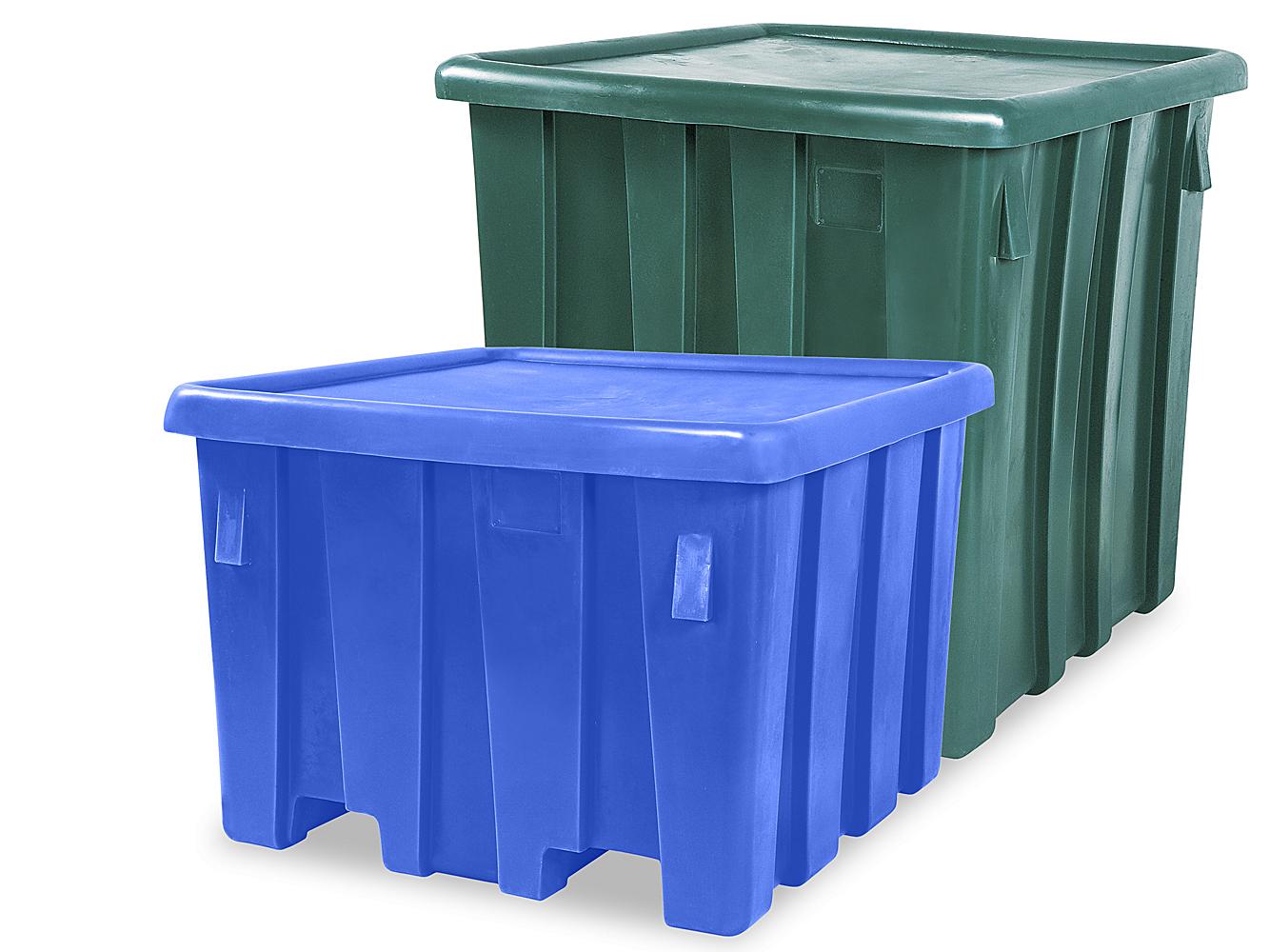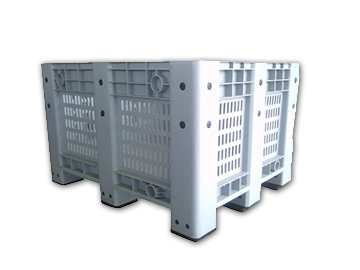The best plastic bulk containers for commercial applications
Wiki Article
A Comprehensive Guide to the Different Types of Mass Plastic Containers Available Today
Mass plastic containers play a crucial role in various sectors, providing remedies for storage and transport. Their diverse types deal with various demands, from inflexible options for solid products to versatile containers fitting different shapes. Each type provides distinct benefits, making it necessary to understand their applications and attributes. As industries advance, so do the needs for efficient container services. What variables should one consider when selecting the appropriate mass container?Summary of Mass Plastic Containers

Sorts Of Mass Plastic Containers
Mass plastic containers come in different kinds, each suited to particular applications. Stiff mass containers, adaptable mass containers, and intermediate bulk containers stand for the primary categories, each offering distinct advantages. Comprehending these kinds is vital for selecting the right container for moving and keeping materials.
Rigid Bulk Containers
Inflexible mass containers are vital for reliable storage and transport of numerous products throughout sectors. These containers are generally created from long lasting plastics, permitting them to endure severe handling and environmental conditions. They come in numerous shapes and sizes, consisting of drums, totes, and containers, making them appropriate for saving every little thing from granular compounds to fluids. Inflexible containers frequently include enhanced walls and secure lids, guaranteeing the contents stay safeguarded throughout transportation. Their stackable layout makes best use of storage space, making them optimal for stockrooms and making centers. Furthermore, numerous rigid mass containers are recyclable and reusable, contributing to sustainability efforts. On the whole, their toughness and flexibility make rigid bulk containers an essential part in supply chain procedures.Flexible Mass Containers
Adaptable mass containers, often described as adaptable intermediate mass containers (FIBCs), work as a functional option for keeping a variety and transferring of completely dry materials. These containers are normally made from woven polypropylene and are created to be lightweight yet strong, permitting effective handling and stacking. Their flexibility allows them to suit numerous forms and sizes, making them suitable for items varying from grains to chemicals. FIBCs can be geared up with functions such as spouts for easy filling and discharge, as well as safety coverings for boosted sturdiness. Furthermore, they are recyclable and reusable, adding to lasting practices in industries such as agriculture, food processing, and construction. Generally, versatile bulk containers provide a economical and efficient option for bulk material administration.Intermediate Bulk Containers
Intermediate bulk containers (IBCs) are vital for the reliable transport and storage of liquids and granular materials across different markets. These containers normally have an ability varying from 275 to 330 gallons and are developed for easy dealing with and stacking. Made from sturdy products like high-density polyethylene or steel, IBCs supply outstanding security against contamination and ecological variables. Their style includes functions such as an integrated pallet for forklift accessibility and a detachable top for very easy dental filling and cleansing. IBCs are commonly used in chemical, food, and pharmaceutical industries, guaranteeing compliance with safety guidelines. Their convenience and reusability make them a cost-effective remedy for mass storage space and transport, adding to supply chain efficiency and sustainability.Features and Advantages of Bulk Plastic Containers
Bulk plastic containers are essential devices in various industries, providing a combination of longevity and practicality. These containers are built from top notch materials, making them resistant to impacts, chemicals, and environmental aspects. This effectiveness guarantees product security during storage space and transportation.Additionally, bulk plastic containers are light-weight, promoting ease of decreasing and taking care of delivery costs. Their stackable design makes best use of storage space performance, enabling optimized warehouse room. Numerous designs feature safe and secure lids or closures, providing an impermeable seal that protects against and maintains contents contamination.
Bulk plastic containers are recyclable and typically multiple-use, adding to lasting techniques. Their flexibility permits a variety of applications, from food storage to commercial usage, enhancing their value across fields. Organizations gain from the lengthy lifespan and low maintenance demands of these containers, making them an affordable option for both temporary and long-lasting needs.
Industries That Use Bulk Plastic Containers
Different sectors gain from making use of mass plastic containers, each leveraging their one-of-a-kind properties for certain applications. The food and drink industry relies upon these containers for safe storage space and transportation of products, while the chemical production sector utilizes them for dealing with harmful products. In addition, the pharmaceutical circulation needs stress the relevance of durability and tidiness in product packaging remedies.Food and Drink Market
As the demand for risk-free and effective storage space remedies remains to rise, the food and beverage sector significantly relies upon bulk plastic containers for their functional requirements. These containers give durable, lightweight, and versatile alternatives for saving components, ended up products, and waste products. Made from food-grade products, they guarantee compliance with health and wellness and safety criteria. Different styles, such as stackable bins and lug boxes, enhance area throughout transport and storage space, boosting logistical effectiveness. In addition, the transparency of some mass containers enables simple inventory administration, decreasing the danger of wasting. With the market's emphasis on sustainability, lots of makers are now supplying recyclable and reusable options, lining up with environment-friendly practices while meeting the high needs of food security and health.
Chemical Production Sector
The chemical production field counts greatly on mass plastic containers for the reliable and safe storage space of basic materials, intermediates, and finished products. These containers are created to withstand different chemicals, ensuring that unsafe products do not leakage or break down the container itself. Usual types consist of high-density polyethylene (HDPE) and polypropylene containers, which use superb chemical resistance and resilience. Their lightweight nature and stackable design promote transport and storage space, maximizing space in making centers. Furthermore, many mass plastic containers feature functions such as tamper-evident seals and easy-to-read labeling, improving security and compliance with industry regulations. Overall, mass plastic containers are indispensable to the chemical production process, providing dependable services for managing varied compounds.Drug Distribution Requirements
Pharmaceutical circulation counts on mass plastic containers to satisfy rigorous security and regulatory needs. These containers are vital for transferring and storing a selection of pharmaceutical products, including active pharmaceutical active ingredients (APIs) and completed drugs. Their design guarantees security against contamination, dampness, and light, keeping the integrity of sensitive products. Furthermore, bulk plastic containers are certified with sector criteria such as Excellent Production Practices (GMP) and are often made from products that are FDA-approved. Using these containers boosts efficiency in the supply chain, enabling risk-free, large distribution while reducing waste. Companies in the pharmaceutical market prioritize using long lasting, watertight, and tamper-evident containers to assure product security and top quality throughout the logistics procedure.Considerations for Choosing the Right Container
When selecting the suitable mass plastic container, various elements need to be thoroughly evaluated to ensure excellent functionality and safety. The nature of the products to be stored is vital; compatibility with the container's material can influence honesty and safety and security. Bulk Plastic Containers. Furthermore, the container's shapes and size must line up with the storage space and transport needs, guaranteeing reliable area usageLots capability is one more important factor to consider, as it must accommodate the weight of materials without danger of damage or failure. The design attributes, such as venting or covers, can affect functionality and gain access to. look at this site Compliance with sector regulations is necessary, especially in industries like pharmaceuticals, where safety requirements are rigorous.
Finally, the anticipated life-span and resilience of the container must be assessed to validate it fulfills the functional demands without frequent replacement. By evaluating these aspects, one can pick one of the most appropriate bulk plastic container for particular applications.
Environmental Influence and Sustainability
As businesses increasingly focus on sustainability, the environmental influence of mass plastic containers has come under examination. These containers, typically made from products such as polyethylene or polypropylene, add considerably to plastic waste otherwise managed properly. Their production includes the consumption of nonrenewable fuel sources, which can result in increased greenhouse gas discharges. Nevertheless, developments in reusing innovation and the advancement of biodegradable alternatives are aiding to minimize these problems.In addition, lots of suppliers are embracing methods that emphasize using recycled materials, thereby decreasing the demand for virgin plastics. The resilience of mass plastic containers likewise contributes; they are made to be reused several times, which can decrease their general ecological footprint when compared to single-use choices. Ultimately, the industry encounters the obstacle of balancing functionality with ecological responsibility, making lasting techniques necessary for the future of bulk plastic containers.
Best Practices for Storage Space and Transportation
Effective storage and transportation of mass plastic containers significantly influence both functional performance and sustainability. To make best use of room, companies should stack containers safely, guaranteeing security and stopping damage. Correct labeling is important for simple recognition, which improves access procedures. Additionally, maintaining a tidy and organized storage location minimizes the danger of contamination and boosts safety.For transport, selecting the ideal vehicle is vital; containers must be safeguarded to avoid changing throughout transportation. Companies should likewise take into consideration utilizing pallets to assist in easier loading and discharging. Normal inspections of containers for wear and tear can avoid pricey substitutes.
Temperature level control is an additional crucial aspect, as extreme conditions can jeopardize the honesty of the plastic. Training employees on best methods for dealing with and transportation useful source assurances compliance and advertises a culture of safety. By implementing these ideal methods, companies can improve their functional effectiveness while contributing to ecological sustainability.
Frequently Asked Inquiries
Just how Do I Tidy Mass Plastic Containers Successfully?
To tidy mass plastic containers successfully, one must wash them with warm water, make use of a light detergent and scrub with a soft brush. Rinse extensively, then permit to air dry completely before storage space or reuse.What Is the Life-span of Bulk Plastic Containers?
The life expectancy of mass plastic containers typically varies from 5 to ten years, relying on the material, usage, and environmental conditions. Appropriate upkeep and storage space can significantly prolong their use and durability with time.Can Bulk Plastic Containers Be Customized?

Do Bulk Plastic Containers Have Guarantee Options?

weblink
Are There Laws for Using Bulk Plastic Containers?
Yes, policies exist for using mass plastic containers, mostly concentrated on safety and security, ecological influence, and material conformity. These policies ensure that containers meet industry standards and are suitable for transferring numerous materials safely and effectively.Stiff mass containers, versatile mass containers, and intermediate bulk containers represent the main groups, each offering special benefits. Flexible bulk containers, commonly referred to as adaptable intermediate mass containers (FIBCs), offer as a versatile solution for transferring and keeping a selection of dry products. The chemical manufacturing market depends greatly on bulk plastic containers for the reliable and safe storage of raw materials, intermediates, and completed items. bulk plastic containers for sale. These containers are designed to endure different chemicals, making certain that dangerous products do not leak or weaken the container itself. Furthermore, mass plastic containers are certified with market criteria such as Excellent Production Practices (GMP) and are typically made from materials that are FDA-approved
Report this wiki page